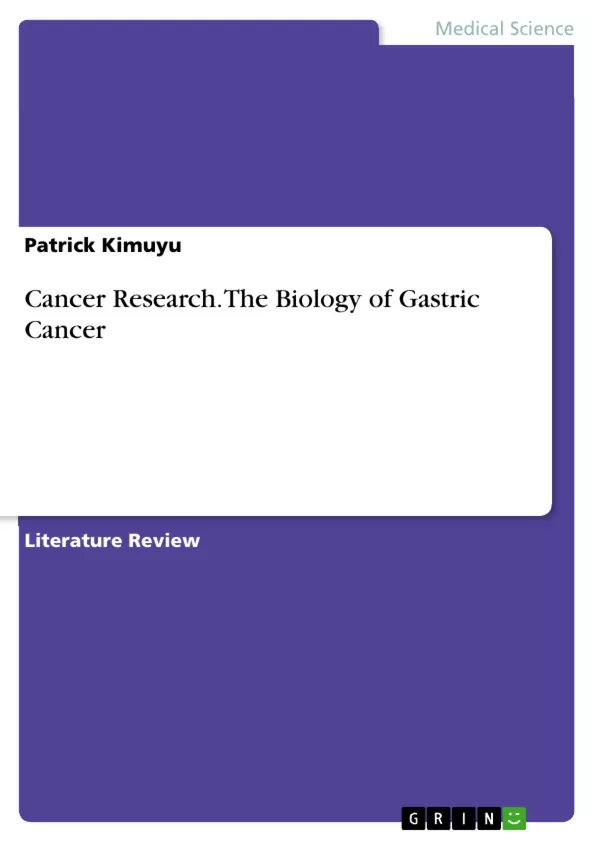From a pathological perspective, cancers occur due to the failure of the immune system. It is evident that the immune system plays key roles in preventing cancer through regulating cell population in the body. Ordinarily, the body’s immune system is usually involved in some cellular processes, especially in the cell cycle in which it destroys old or defective cells through programmed cell death, a process commonly known as apoptosis. In the context of cancer, this process is usually impaired, thus damaged or defective cells are not destroyed by the immune system. In addition, the impairment of the immune system’s activity affects cellular homeostasis processes including irregular cell division. These factors are responsible for tumor growth and progression of cancer. Gastric cancer affects the digestive system, primarily the stomach. Anatomically, the stomach occupies the region from the esophageal junction to the duodenum. Therefore, aim of this research is to carry out a comprehensive review of gastric cancer, also known as stomach cancer.
Inhaltsverzeichnis (Table of Contents)
- Introduction
- Biological Changes during Onset and Progression of Gastric Cancer
- Distinctive Characteristics of Cancer Cells
- Effect of Gastric Cancer in the Body
- Therapies for Gastric Cancer
- Lifestyle Changes in Gastric Cancer Prevention and Treatment
- Relationship between Gastric Cancer and other Cancers
Zielsetzung und Themenschwerpunkte (Objectives and Key Themes)
This research provides a comprehensive review of gastric cancer, exploring its biological underpinnings, distinctive characteristics, and effects on the body.
- The biological changes that occur during the onset and progression of gastric cancer, including genetic alterations and their impact on cell function.
- The distinctive characteristics of cancer cells compared to normal cells, focusing on differences in shape, size, nucleus appearance, and tissue arrangement.
- The effects of gastric cancer on the body, including the disruption of stomach function, potential bleeding, and metastasis.
- The role of the immune system in cancer development and the implications of its impairment in gastric cancer.
- The relationship between gastric cancer and other cancers, including potential links and shared characteristics.
Zusammenfassung der Kapitel (Chapter Summaries)
- Introduction: This chapter introduces the concept of cancer from a pathological perspective, emphasizing the role of the immune system in preventing and regulating cell populations. It highlights the impairment of immune function in cancer development, particularly in gastric cancer, which affects the digestive system.
- Biological Changes during Onset and Progression of Gastric Cancer: This chapter examines the genetic and epigenetic modifications that occur in gastric cells during the onset and progression of cancer. It explores the impact of these alterations on gene expression, protein production, and cellular processes.
- Distinctive Characteristics of Cancer Cells: This chapter contrasts the characteristics of cancer cells with normal cells, focusing on differences in shape, size, nucleus appearance, and tissue arrangement. It emphasizes the significance of these distinctions in pathological investigations.
- Effect of Gastric Cancer in the Body: This chapter delves into the pathophysiology of gastric cancer, explaining how the disease affects the body as it progresses. It examines the disruption of stomach function, potential bleeding, and the phenomenon of metastasis.
Schlüsselwörter (Keywords)
Gastric cancer, cancer biology, immune system, genetic alterations, gene expression, cell function, cancer cells, normal cells, pathophysiology, metastasis, digestive system, stomach function, tumorigenesis, immune surveillance, epigenetic modifications, cell signaling.
Frequently Asked Questions
What is gastric cancer?
Gastric cancer, also known as stomach cancer, is a disease where malignant cells form in the lining of the stomach, affecting the digestive system from the esophageal junction to the duodenum.
How does the immune system relate to cancer development?
Cancers often occur when the immune system fails to destroy damaged or defective cells through apoptosis (programmed cell death), leading to irregular cell division and tumor growth.
What are the distinctive characteristics of cancer cells?
Cancer cells differ from normal cells in shape, size, the appearance of the nucleus, and their arrangement within tissues, which are key factors in pathological diagnosis.
What biological changes occur during the progression of gastric cancer?
Progression involves genetic and epigenetic modifications that alter gene expression, protein production, and cellular signaling, disrupting homeostasis.
Can lifestyle changes help prevent gastric cancer?
The research explores the role of lifestyle changes in both the prevention and treatment of gastric cancer, emphasizing their impact on overall digestive health.
- Arbeit zitieren
- Patrick Kimuyu (Autor:in), 2017, Cancer Research. The Biology of Gastric Cancer, München, GRIN Verlag, https://www.grin.com/document/384370



